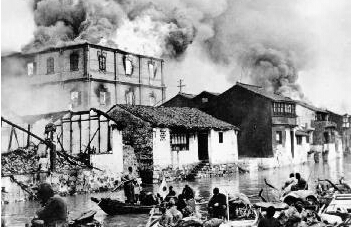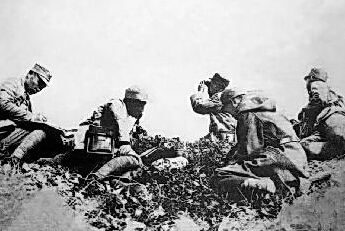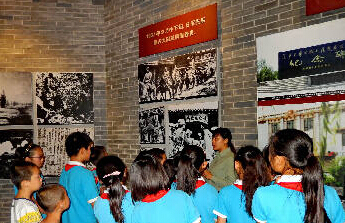United Chinese front against Japanese aggression
 0 Comment(s)
0 Comment(s) Print
Print E-mail China Today, September 2, 2015
E-mail China Today, September 2, 2015
|
|
| Japanese troops attack Shanghai on August 13, 1937, decimating Zhaibei and Nanshi districts. |
|
|
| General Lin Biao and General Nie Rongzhen fought and won the Great Victory of the Pingxingguan Battle in September 1937. |
Baiyatai Village Memories
On September 25, 1937, 35-year-old Zeng Huai encountered the Eighth Route Army as he walked out of the village. “A general riding a tall horse, accompanied by four guards, asked my father to guide the troops,” Zeng Shirong, son of Zeng Huai, recalled. He was then just three years old. “I can remember my father repeatedly telling the story of that fierce battle since I was five,” 81-year-old Zeng Shirong told the reporters. China’s history textbooks refer to the battle as “the Great Victory of Pingxingguan.”
A black-and-white photo of the young Zeng Huai occupies pride of place in Zeng Shirong’s home. Zeng senior acted as guide for the Eighth Route Army and also organized a group of stretcher-bearers to carry the wounded five miles to a village nearby. It was only after the battle that Zeng realized the commander he had met that morning was the celebrated General Nie Rongzhen.
The “10-mile Qiaogou Valley” where the fiercest battle took place can be seen from the high land overlooking it nearby Laoye Temple in Baiyatai Village of Lingqiu County in Shanxi Province. The terrain appears as a bulging pocket with a small opening and stretches 10 miles from Laiyuan in Hebei Province to Lingqiu in Shanxi. It is also the sole path to Taiyuan, capital city of Shanxi. Qiaogou Valley was around 10 meters wide, with steep, 20-meter-high cliffs on either side. This narrow dirt road through the valley hence gave no shelter. It was here that the 115th Division of the Eighth Route Army annihilated more than 1,000 Japanese soldiers, destroyed more than 60 Japanese vehicles, and captured weapons and ammunition. The victory was the Eighth Route Army’s first triumph in the nationwide resistance against the Japanese army. From then on, the eighth Route Army became a main force behind enemy lines.
Today, two landmark constructions still stand in Baiyatai Village. One is the 115th Division battle command office at the village entrance, where General Lin Biao and General Nie Rongzhen waged the Pingxingguan Battle. The other is the Laoye Temple where the 8th Route Army engaged in a bloody battle against the Japanese army and eventually regained the strategic site.
|
|
| Baiyatai villager Zeng Shirong recalls the story of his father, who acted as a guide for the Communist-led Eighth Route Army during Pingxingguan Battle. |
"Mom, I Miss Home"
Mao Zedong summarized the significance of the Great Victory of Pingxingguan at a meeting in September 1938 in Yan’an, saying that it was a vital political campaign that mobilized millions of Chinese civilians in the battle against Japanese invaders.
There is on display at the Pingxingguan Memorial Museum a photo of Shanghai citizen Pu Jiting and his two daughters. When the triumphant news came to Shanghai, the two girls saved their candy money to buy two military telescopes and mailed them to Generals Zhu De and Peng Dehuai to help bolster the Chinese army.
The Japanese army, meanwhile, retreated, broken and thoroughly demoralized. When the 8th Route Army and local villagers cleaned up the battlefield, they discovered a letter written by a young Japanese soldier surnamed Miura to his fiancée. “Death is such a common thing in battles. Several friends that were with me have died for no apparent reason,” he wrote, “A gunshot struck down and killed one soldier walking in front of us without warning. We are in constant dread fear of death.” Another young soldier wrote to his mother, “Mom, I am only 18. Why should I come such a long a way to kill Chinese people? Mom, I miss home. A few days ago when I passed through a village, the officer ordered us to burn down the houses and kill the civilians. They were all poor peasants. When their blood spurted over me, I felt so scared. I did not want to kill anyone, least of all these common folks. I came here for the ideal of fighting for the great honor of Japan. But now, Mom, I want to go home and study at school.”
|
|
| Pupils in Lingqiu County visit the Great Victory of Pingxingguan Museum. |










Go to Forum >>0 Comment(s)